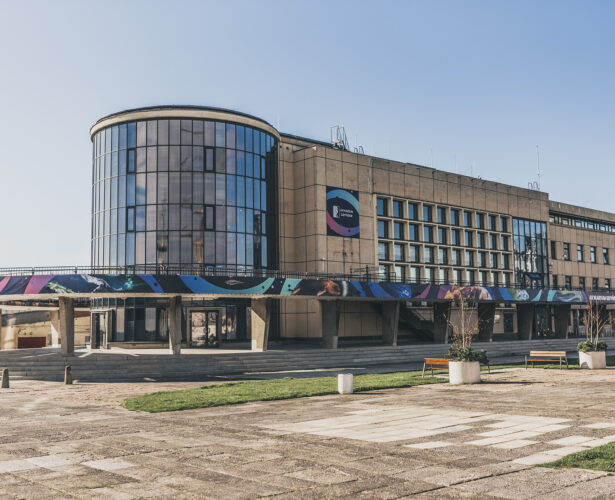
Accessibility Integration
and Artificial Intelligence for Museums
About the project
AIMused is the first initiative in the South Baltic region that combines artificial intelligence and accessibility in educational tourism.
Its goal is to make the content and experiences offered by tourist attractions more accessible – so that everyone, regardless of age, ability or perception of the world, can enjoy them fully.
The project brings together institutions with diverse profiles – museums, an aquarium, SMEs and universities. This cross-sectoral collaboration merges scientific, technological and social expertise to create tools that will make tourism more inclusive, understandable and visitor-friendly.

Project co-financed by the European Regional Development Fund under the Interreg South Baltic Programme 2021–2027.
Project objective
Across Europe – and in the South Baltic region as well – societies are ageing and the number of people with cognitive and accessibility needs is growing.
According to Eurostat data (2023), 27% of Europeans aged 16 and over reported having some form of disability. This equals 101 million people, or one in four adults in the EU.
For the countries in our region, the statistics are as follows:
Poland – 24.4%, Germany – 28.2%, Denmark – 36.7%, Lithuania – 27.4%, Sweden – 22.6%.
The AIMused project aims to improve the digital and informational accessibility of tourist attractions and to create a more inclusive offer for people with diverse needs – including persons with disabilities, older adults and neurodivergent visitors. The project uses modern tools, including those based on artificial intelligence, to help attractions adapt their content and communication to different audiences.
Presenting information in a way that is accessible to as many people as possible strengthens their participation in cultural, educational and environmental experiences.
This is why inclusive solutions are needed – so that everyone can take part in tourism and learning without barriers and in a way that matches their abilities.
Project impact
AIMused will set new standards for content accessibility in educational tourism.
Through international cooperation, the project will deliver scalable and transferable solutions that can be implemented in various types of institutions – from science centres and museums to theme parks and nature heritage sites.
It will help organisations develop offers that combine education, technology and accessibility – so that everyone can take part in discovering the world.
What will be developed?
- Guidelines describing best practices for accessibility in tourism, universal design and plain language,
- Digital and physical tools improving access to content in tourist sites,
- Training and workshops for tourism and education professionals on communication, cognitive accessibility and the use of AI to support visitors,
- Publications – scientific and popular – summarising the project’s results and recommendations for the tourism sector.
All solutions will be tested in different South Baltic countries with the participation of people with special needs and accessibility experts.
Project partners
- National Marine Fisheries Research Institute – Gdynia Aquarium (Poland)
- University of Szczecin (Poland)
- Lithuanian Sea Museum (Lithuania)
- NaturBornholm (Denmark)
- Technical University of Applied Sciences Wildau (Germany)
- Kalmar County Museum (Sweden)
- KL Kulturland MV gGmbH (Germany)
- Nautil – Leszek Chojnicki (Poland)
- and 11 associated partners from Denmark, Germany, Sweden, Lithuania and Poland.
Project duration
18 September 2025 – 18 August 2028
Budget
Total project budget: EUR 2,076,967.75
ERDF co-financing: EUR 1,661,574.20


